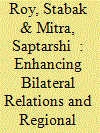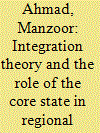| Srl | Item |
| 1 |
ID:
193238


|
|
|
|
|
| Summary/Abstract |
The primary objective of this study is to assess the practicality and consequences of establishing railway connectivity between India and Myanmar. By exploring the possible impact of this initiative on the relationship between the two countries and regional collaboration, this study aims to shed light on its potential benefits and challenges. The railway network aims to enhance connectivity between the Northeastern states of India and Myanmar, providing a new trade route with Southeast Asia. The study was based on policy review, meta-data analysis, bibliometric literature review and case studies using geospatial techniques. The results indicate that the proposed railway connectivity has the potential to boost trade, tourism and investment and strengthen regional cooperation. However, significant challenges such as security concerns, financial viability and political stability need to be addressed to realise the potential of railway connectivity fully. The study concludes that strong political will, effective project management and public–private partnerships are crucial for the success of the India–Myanmar railway connectivity and its potential impact on bilateral relations and regional cooperation.
|
|
|
|
|
|
|
|
|
|
|
|
|
|
|
|
| 2 |
ID:
181640


|
|
|
|
|
| Summary/Abstract |
European Defence is in a new and formative phase in which the European Union’s long list of defence acronyms has steadily grown. One of the most noticeable new policy initiatives is the European Commission’s European Defence Fund (EDF). This article consequently investigates and outlines the establishment of the European Defence Fund and the European Commission’s new role within the field of security and defence through the lens of revised neofunctionalism. This article thus asks how and through what steps did the EDF come about; and secondly how can neofunctionalism explain the dynamics involved in the establishment of the European Defence Fund. The analysis uses a process-tracing method and draws on interviews with relevant policymakers and officials in Brussels as well as official EU documents. The conclusions argue that the ever-increasing involvement of the European Commission in a policy field close to national sovereignty is starting to blur the traditional dichotomy between intergovernmental and supranational decision-making. In this way, this study contributes to the growing literature on the weakening of intergovernmentalism within the EU security and defence policy field.
|
|
|
|
|
|
|
|
|
|
|
|
|
|
|
|
| 3 |
ID:
123656


|
|
|
| 4 |
ID:
185236


|
|
|
|
|
| Summary/Abstract |
To secure an oil and gas supply, China has built several types of energy infrastructure near its borders and developed energy cooperation with regional partners based on this infrastructure. However, not all energy cooperation projects develop at an equal pace or are equally successful. This study employs the neofunctionalist spillover hypothesis—one of several key discourses applied to explaining European integration—to account for the difference in regional cooperation between two China-driven energy megaprojects in Asia: the China–Central Asia Pipelines and the China–Southeast Asia Pipelines. After investigation into the so-called spillover hypothesis, including “functional spillover,” “political spill-over,” and “cultivated spillover,” the more successful of the two projects was also found to be more significant in terms of its spillover effect. Thus, this article finds that regional cooperation in the Chinese context also supports the spill-over hypothesis, which has conventionally been regarded as a Europe-based discourse.
|
|
|
|
|
|
|
|
|
|
|
|
|
|
|
|